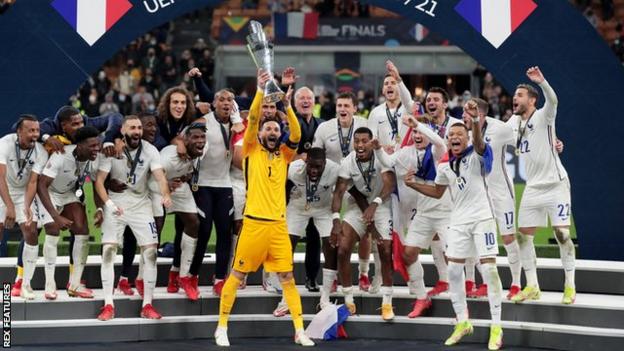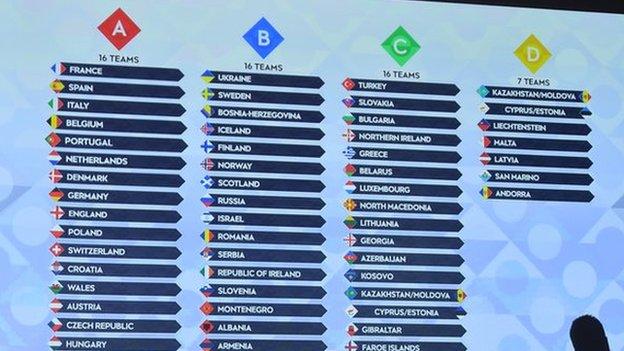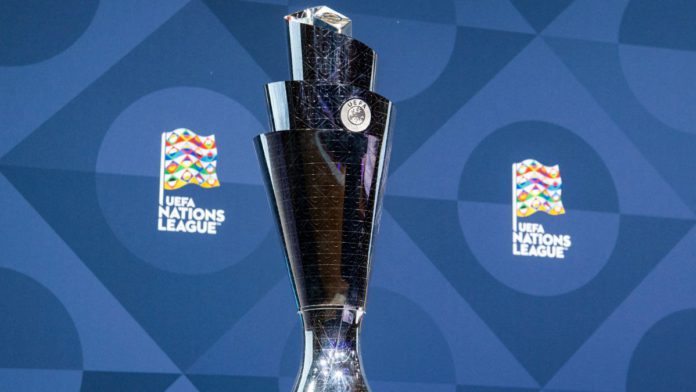The 2022-23 Uefa Nations League starts on Wednesday, with all the home nations in action over the next two weeks.
The competition fills the gap created by the World Cup in Qatar moving to November.
England and Northern Ireland play four group games, while Wales have four along with a World Cup play-off final.
Scotland, who meet Ukraine in a World Cup play-off semi-final on Wednesday, face three Nations League matches, including the Republic of Ireland in Dublin.
The Nations League is a biennial competition in its third edition. It was first won by Portugal in 2019 and France are the defending champions after beating Spain in the 2021 final.
So who are playing, what is the format and what is the point?

Karim Benzema and Kylian Mbappe scored as France came from 1-0 down to beat Spain 2-1 in the 2020-21 final
- How does it work?
As with the 2020-21 edition, the 2022-23 competition consists of three leagues of 16 teams and a fourth of seven.
League A – the top division – and Leagues B and C are split into four groups of four, while League D is made up of a group of four and a three.
The winners of each group in League A qualify for next year’s finals tournament, while the winners of each group in Leagues B, C and D secure promotion to the next league up.
Teams who finish bottom of their groups in League A and B will be relegated, and those in League C will enter a play-off to decide who drops to League D.
Russia, suspended by Uefa because of the invasion of Ukraine, have already been placed bottom of Group B2.

There are 55 Uefa nations, all of whom are in the Nations League, but Russia are not allowed to play their games
- When are the games?
There are four rounds of games between 1 and 14 June and the final two matches will be played from 22-27 September.
The semi-finals will be played on 14 and 15 June, 2023 with the final and third-place play-off on 18 June.
Wales, Belgium, the Netherlands and Poland have applied to host the finals.
Who are the British and Irish teams playing?
Wales have been promoted to the top division for the first time but Northern Ireland are in the third section for the first time following relegation.
England stay in League A, while Scotland and the Republic of Ireland are again in League B.
| A3 | A4 | B1 | C2 |
| Italy | Belgium | Ukraine | Northern Ireland |
| Germany | Netherlands | Scotland | Greece |
| England | Poland | Republic of Ireland | Kosovo |
| Hungary | Wales | Armenia | Cyprus |
Wednesday, 1 June
- Poland v Wales (17:00)
Thursday, 2 June
- Northern Ireland v Greece (19:45)
Saturday, 4 June
- Hungary v England (17:00)
- Armenia v Republic of Ireland (14:00)
Sunday, 5 June
- Cyprus v Northern Ireland (17:00)
Tuesday, 7 June
- Germany v England (19:45)
Wednesday, 8 June
- Wales v Netherlands (19:45)
- Republic of Ireland v Ukraine (19:45)
- Scotland v Armenia (19:45)
Thursday, 9 June
- Kosovo v Northern Ireland (19:45)
Saturday, 11 June
- England v Italy (19:45)
- Wales v Belgium (19:45)
- Republic of Ireland v Scotland (17:00)
Sunday, 12 June
- Northern Ireland v Cyprus (14:00)
Tuesday, 14 June
- England v Hungary (19:45)
- Armenia v Scotland (17:00)
- Ukraine v Republic of Ireland (19:45)
*All times are BST and subject to change
- What other games are worth following?
All of Europe’s heavyweights are in action over the next few days with some playing each other.
Spain host rivals Portugal on 2 June and European champions Italy host four-time World Cup winners Germany in Bologna on 4 June. The reverse fixture takes place in Monchengladbach on 14 June.
Belgium, second in Fifa’s rankings, host the Netherlands in Brussels on 3 June.
- How does this impact Euro 2024 qualifying?
We don’t know yet.
The first Nations League produced all the play-off sides for Euro 2020 – and the second edition provided two play-off places for the 2022 World Cup.
Uefa will announce the format of Euro 2024 qualifying in June.

